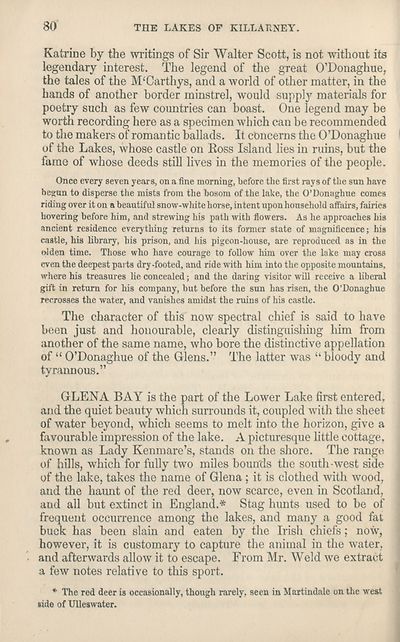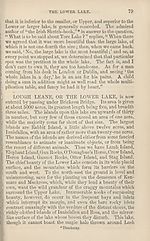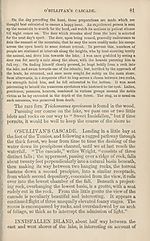Download files
Complete book:
Individual page:
Thumbnail gallery: Grid view | List view

80
THE LAKES OF KILLARNEY.
Katrine by the writings of Sir Walter Scott, is not without its
legendary interest. The legend of the great O’Donaghue,
the tales of the IVTCarthys, and a world of other matter, in the
hands of another border minstrel, would supply materials for
poetry such as few countries can boast. One legend may be
worth recording here as a specimen which can be recommended
to the makers of romantic ballads. It concerns the O’Donaghue
of the Lakes, whose castle on Ross Island lies in ruins, but the
fame of whose deeds still lives in the memories of the people.
Once every seven years, on a fine morning, before the first rays of the sun have
begun to disperse the mists from the bosom of the lake, the O’Donaghue comes
riding over it on a beautiful snow-white horse, intent upon honsehold affairs, fairies
hovering before him, and strewing his path with flowers. As he approaches his
ancient residence everything returns to its former state of magnificence; his
castle, his library, his prison, and his pigeon-house, are reproduced as in the
olden time. Those who have courage to foDow him over the lake may cross
even the deepest parts dry-footed, and ride with him into the opposite mountains,
where his treasures lie concealed; and the daring visitor will receive a liberal
gift in return for his company, but before the sun has risen, the O'Donaghue
recrosses the water, and vanishes amidst the ruins of his castle.
The character of this now spectral chief is said to have
been just and honourable, clearly distinguishing him from
another of the same name, who bore the distinctive appellation
of “ O’Donaghue of the Glens.” The latter was “ bloody and
tyrannous.”
GLENA BAY is the part of the Lower Lake first entered,
and the quiet beauty which surrounds it, coupled with the sheet
of water beyond, which seems to melt into the horizon, give a
favourable impression of the lake. A picturesque little cottage,
known as Lady Kenmare’s, stands on the shore. The range
of hills, which for fully two miles boun'ds the south-west side
of the lake, takes the name of Glena; it is clothed with wood,
and the haunt of the red deer, now scarce, even in Scotland,
and all but extinct in England.* Stag hunts used to be of
frequent occurrence among the lakes, and many a good fat
buck has been slain and eaten by the Irish chiefs; now,
however, it is customary to capture the animal in the water,
and afterwards allow it to escape. From Mr. Weld we extract
a few notes relative to this sport.
* The red deer is occasionally, though rarely, seen in Martindaie on the west
side of Ulleswater.
THE LAKES OF KILLARNEY.
Katrine by the writings of Sir Walter Scott, is not without its
legendary interest. The legend of the great O’Donaghue,
the tales of the IVTCarthys, and a world of other matter, in the
hands of another border minstrel, would supply materials for
poetry such as few countries can boast. One legend may be
worth recording here as a specimen which can be recommended
to the makers of romantic ballads. It concerns the O’Donaghue
of the Lakes, whose castle on Ross Island lies in ruins, but the
fame of whose deeds still lives in the memories of the people.
Once every seven years, on a fine morning, before the first rays of the sun have
begun to disperse the mists from the bosom of the lake, the O’Donaghue comes
riding over it on a beautiful snow-white horse, intent upon honsehold affairs, fairies
hovering before him, and strewing his path with flowers. As he approaches his
ancient residence everything returns to its former state of magnificence; his
castle, his library, his prison, and his pigeon-house, are reproduced as in the
olden time. Those who have courage to foDow him over the lake may cross
even the deepest parts dry-footed, and ride with him into the opposite mountains,
where his treasures lie concealed; and the daring visitor will receive a liberal
gift in return for his company, but before the sun has risen, the O'Donaghue
recrosses the water, and vanishes amidst the ruins of his castle.
The character of this now spectral chief is said to have
been just and honourable, clearly distinguishing him from
another of the same name, who bore the distinctive appellation
of “ O’Donaghue of the Glens.” The latter was “ bloody and
tyrannous.”
GLENA BAY is the part of the Lower Lake first entered,
and the quiet beauty which surrounds it, coupled with the sheet
of water beyond, which seems to melt into the horizon, give a
favourable impression of the lake. A picturesque little cottage,
known as Lady Kenmare’s, stands on the shore. The range
of hills, which for fully two miles boun'ds the south-west side
of the lake, takes the name of Glena; it is clothed with wood,
and the haunt of the red deer, now scarce, even in Scotland,
and all but extinct in England.* Stag hunts used to be of
frequent occurrence among the lakes, and many a good fat
buck has been slain and eaten by the Irish chiefs; now,
however, it is customary to capture the animal in the water,
and afterwards allow it to escape. From Mr. Weld we extract
a few notes relative to this sport.
* The red deer is occasionally, though rarely, seen in Martindaie on the west
side of Ulleswater.
Set display mode to:
![]() Universal Viewer |
Universal Viewer | ![]() Mirador |
Large image | Transcription
Mirador |
Large image | Transcription
| Antiquarian books of Scotland > Ireland/Irish > Black's guide to Killarney and the south of Ireland > (92) |
|---|
| Permanent URL | https://digital.nls.uk/118861772 |
|---|
| Description | Thousands of printed books from the Antiquarian Books of Scotland collection which dates from 1641 to the 1980s. The collection consists of 14,800 books which were published in Scotland or have a Scottish connection, e.g. through the author, printer or owner. Subjects covered include sport, education, diseases, adventure, occupations, Jacobites, politics and religion. Among the 29 languages represented are English, Gaelic, Italian, French, Russian and Swedish. |
|---|

